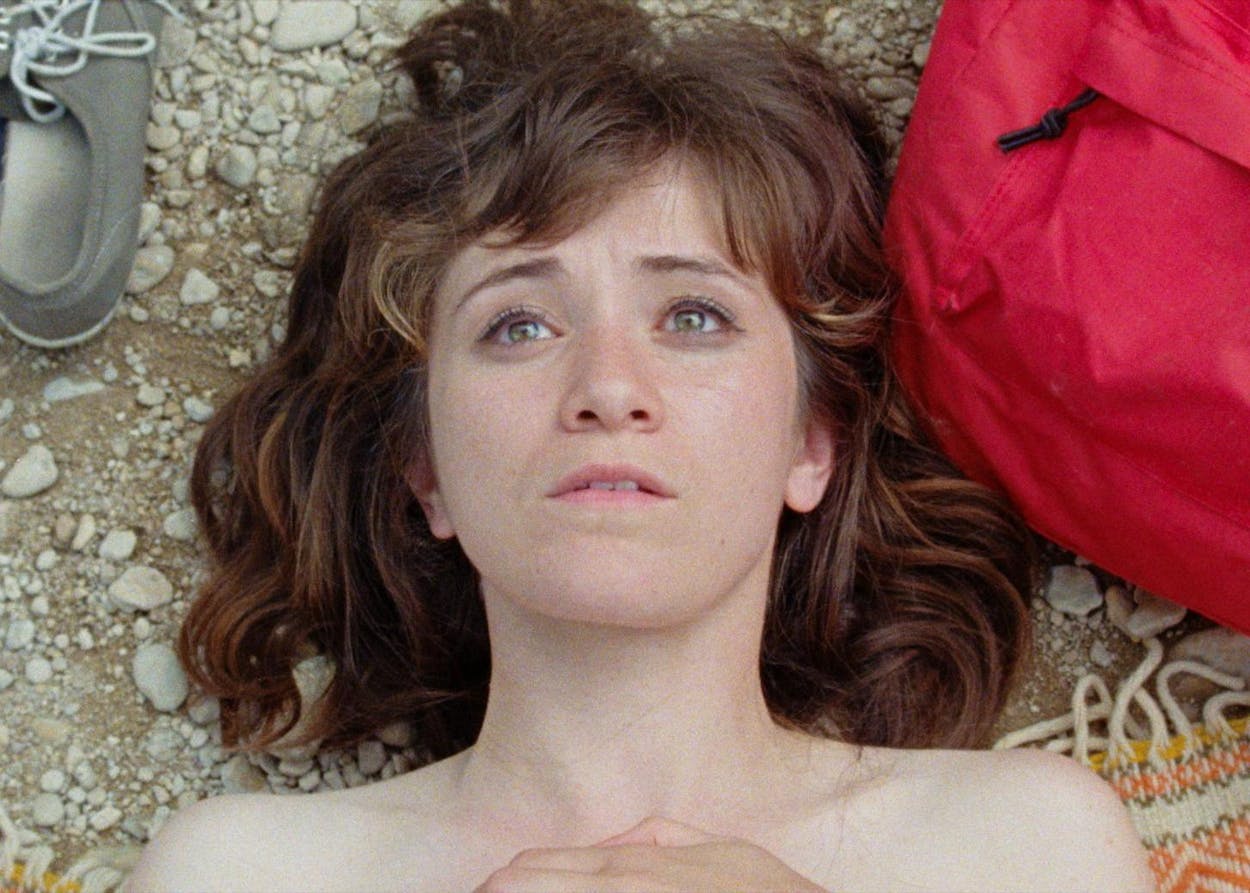San Antonio native and Saturday Night Live alum Noël Wells has known she wanted to make a movie about Austin since she was a film student at the University of Texas. And last year, she finally did it, writing, directing, and filming the Austin-based indie pic Mr. Roosevelt, which had its world premiere at SXSW on Sunday. Her directorial debut tells the story of struggling Los Angeles comedienne Emily Martin, who returns to Austin to care for a sick loved one. While there, she stays in her former house with her ex-boyfriend Eric and his new girlfriend, Celeste. We get to know Emily as she struggles to accept the changes she sees in Eric and in Austin—both seeming to have moved on in ways she finds inauthentic.
As a native Austinite, I’m generally skeptical of any film (or T-shirt slogan) that tries to capture the spirit of my hometown, but Mr. Roosevelt does as good a job mirroring my young adulthood as Boyhood did for my childhood days. Wells’s film not only nails down the look and feel of the lush Texas capital, but it captures the present tension between old lazy Austin and shiny new Austin.
It has long been my opinion that the most Austin thing an Austinite can do is complain about how much better the city used to be before Californians started moving here. Emily falls easily into that trap when she first gets back in town. She derides Eric’s newly acquired ambition and ridicules his gluten-free, home-renovating friends. She leans into some old pals, smoking weed at the Greenbelt and having that conversation that everyone does at a municipal Austin swimming pool: “You know it’s legal for a woman to be topless here, right?”
But Wells doesn’t pick a side in this tale of two cities; everyone gets mocked in Mr. Roosevelt. And—I say this with love—Austinites deserve to be mocked sometimes.
That’s not to say that the film is entertaining only for an audience with connections to the Live Music Capital of the World. It’s also belly-laugh funny. In Mr. Roosevelt, Wells has found a way to showcase her complete skill set—her melancholic wit, her diverse character acting, and her proficiency at arm-flailing, Gilda Radner–like physical comedy—more than she ever did in her work on SNL and in Netflix’s Master of None.
Wells chatted with Texas Monthly about her directorial debut and her feelings about change, emotional maturity, and Mexican food.
Emily McCullar: I read somewhere that the main character in Mr. Roosevelt was something you had in your head for quite a while. At what point in the screenwriting process did you decide to set the story in Austin?
Noel Wells: When I was in college. It was always going to be a story about this girl going back to Austin. Austin is such an indie-film skeleton, and I knew I wanted to shoot it here. I wanted to work with the people I know that are talented here. It’s such a character and such a place that I don’t really see anywhere else. Not everybody is doing Austin movies, and if they are they might be a little superficial. It just felt like the most honest place to set it.
EM: Did you use some of your contacts from the University of Texas’s Radio-Television-Film program to make the film?
NW: I did contact one of my old professors, Geoff Marslett, who I took a lot of classes from. You know how in the movie she leaves two boxes behind? That was actually real. I had a boyfriend in college and when I moved to L.A., I broke up with him and left behind a couple of boxes. When he moved in with his new girlfriend, he said, “You gotta do something with these boxes. I can’t take your stuff with me.” So Geoff Marslett took them for me. My film teacher took my boxes.
EM: Those were real boxes?!
NW: The stuff in the boxes in the movie were the things that were really in there! When I came to film here, I called Geoff, who owns a house here but teaches, I think, in Colorado. So his friend gave me the boxes. When I opened up my first box, it had my old directing notebook from college. So that was my one contact that I relied on.
EM: I actually wrote in my notes that the boxes were some of the film’s many Austin inside jokes. When your character opened one box, there was a Clerks shirt and a romper that looked like it could have been purchased at the old Blue Velvet on the drag. It very much felt like these were the boxes a young Austin girl would leave behind. The other inside jokes I noted were her struggle to ride a bike up Austin’s hills, and, of course, the legally topless swimmers at the Greenbelt. Whenever I go to Barton Springs, I always forget that there are gonna be boobs.
NW: Yeah! And you’re like, I love this and I support you, but I can’t go there myself.
EM: Were there any other Austin jokes that ended up on the cutting room floor?
NW: There were a lots, actually. I tried to do a lot more of that kind of stuff that maybe didn’t get executed correctly, or it wasn’t right timing-wise. My hope was that there was even more of that stuff, but at the end of the day, you want to service the film and the story and not diverge too much.
EM: In the story, Emily is sort of stuck between two Austins. There’s the old one epitomized by the Slacker mentality—the “velvet rut” as you say in the film—and then there’s the new Austin, which has remodeled bungalows and gluten-free businesspeople. How do you feel that conflict was resolved at the end of the film?
NW: Okay, the easy thing to say is “f—k this change.” In a lot of way, yes, it’s ruining things. But it’s felt all across the country. There are people collecting wealth, coming into these cities and buying property, then tearing things down to build things that don’t fit in the community or aren’t for the community. I think the more important thing is for us all to be conscious of the impact that we make in the world. There’s nothing wrong with being upwardly mobile and buying a house and making it beautiful. That’s within all of our rights. We just have to keep in mind who’s in our community and we have to help them too. Emily is so opposed to all of this change, especially the change she sees in Eric. But I think I was trying to say that it’s not bad to change and it’s not bad to evolve as along as you’re doing it thoughtfully.
EM: How early on did SXSW start talking to you about showing the film at the festival?
NW: We sent it to them as a late submission. Jared, who did the Q&A after the premiere yesterday, told me what happened. We asked them to watch it in a theater and they were kind of like, “oh my God.” They didn’t really know who I was as a director. When they finally watched in the theater, they really wanted it in the festival. But at first they were sort of incredulous.
EM: I hear a lot about a golden age of television these days, but do you also feel this is a great era for comedy? There are so many opportunities for comedians to make their own career paths.
NW: I think for comedy that’s always how it’s been. If you’re going to do comedy you have a specific point of view and you kind of have to do it yourself. As a broke filmmaker, it’s definitely a cool time, because you can get resources anywhere. And as a comedian, you can share your stuff much quicker and be seen a lot faster rather than having to travel the country through comedy clubs. For any creator it’s a great time to take your career into your own hands.
EM: At one point, Emily, a sketch comedian, says it’s difficult to describe what she does. Do you feel that the film, with its melancholy tone and physical comedy, is representative of what you do?
NW: The film itself is representative of this step that I wanted to take. It is more representative of what I do, but every time I do something I learn I can do something else. I feel like this is one of my babies, and it feels very honest and true to the way I see the world. But you get all these other people involved, and it evolves with other people as well.
EM: Finally, the most important question for our readers: In the movie, your character says that Mexican food in Austin is better than Mexican food in L.A. Can you elaborate on that?
NW: I will just say that it is a fact. You can’t argue with it. Anybody who tries to tell you otherwise is delusional.
EM: I agree. I lived in California briefly and was initially very bothered by burritos. It’s too much of one flavor.
NW: It’s just like throwing a bunch of garbage into a sack. I mean, it’s food, but it’s like a casserole in a sack.








